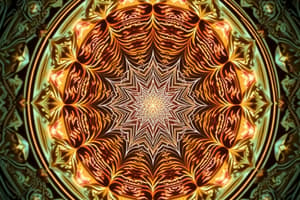Podcast
Questions and Answers
Who laid the foundation for the formal procedures of lens design in the 18th century?
Who laid the foundation for the formal procedures of lens design in the 18th century?
- Gauss (correct)
- Ernst Karl Abbe
- Isaac Newton
- Lord Rayleigh
What is the main area of focus in the subtopic of geometrical optics?
What is the main area of focus in the subtopic of geometrical optics?
- The behavior of light in different materials
- The image-forming properties of lenses, mirrors, and other optical devices (correct)
- The communication of information through light signals
- The properties of matter through spectroscopy
When did the field of optics experience a resurgence based on information and communication theory?
When did the field of optics experience a resurgence based on information and communication theory?
- Mid-20th century (correct)
- Early 20th century
- 19th century
- Late 20th century
What is the role of geometrical optics in the field of spectroscopy?
What is the role of geometrical optics in the field of spectroscopy?
What is an application of geometrical optics?
What is an application of geometrical optics?
Who is the German physicist that made significant contributions to the field of optics?
Who is the German physicist that made significant contributions to the field of optics?
What is the main focus of the subtopic of geometrical optics?
What is the main focus of the subtopic of geometrical optics?
Who developed formulas for calculating the position and size of images formed by lenses?
Who developed formulas for calculating the position and size of images formed by lenses?
What is the field of physics that deals with the behavior of light?
What is the field of physics that deals with the behavior of light?
What is the application of geometrical optics in modern times?
What is the application of geometrical optics in modern times?
What is the origin of the field of optics?
What is the origin of the field of optics?
What is the extension of geometrical optics in modern times?
What is the extension of geometrical optics in modern times?
Flashcards are hidden until you start studying
Study Notes
Physics: Optics
Overview of the Subtopic: Geometrical Optics
Optics is the field of physics that deals with the behavior of light. It includes the study of the properties and phenomena associated with light, as well as the design and use of devices that manipulate light. The subtopic of geometrical optics focuses on the image-forming properties of lenses, mirrors, and other optical devices. It is a branch of optics that uses geometric principles and concepts to describe the behavior of light in optical systems.
Historical Development
Optics as a field has a long history, originating from the study of the human eye and its ability to perceive light. As technology advanced, so did the understanding and application of optics. In the 19th century, significant progress was made in the field, with the work of mathematicians like Carl Friedrich Gauss, who developed formulas for calculating the position and size of images formed by lenses of a given focal length.
Geometrical Optics Today
Today, geometrical optics is used in various applications, including lens design and the analysis of light propagation through optical systems. The field has also been extended to include the manipulation of light in the electromagnetic spectrum, including X-rays, ultraviolet, infrared, and microwave radio waves.
Contributions to Geometrical Optics
Several notable physicists and scientists have contributed to the field of geometrical optics. Gauss, an 18th-century mathematician, laid the foundation for the formal procedures of lens design with his classical book on geometrical optics. In the 19th century, an English physicist, Lord Rayleigh, and a German physicist, Ernst Karl Abbe, made significant contributions to the field. Since the mid-20th century, there has been a resurgence in optics based on information and communication theory.
Applications of Geometrical Optics
Geometrical optics is used in various applications, including the design of optical systems for telescopes, microscopes, and other instruments. It also plays a crucial role in the field of spectroscopy, which deals with the analysis of light to study the properties of matter.
In conclusion, geometrical optics is a subtopic within the broader field of optics that focuses on the image-forming properties of lenses, mirrors, and other optical devices. It has a rich history and has contributed significantly to the understanding and application of light in various fields. Today, geometrical optics continues to be relevant in the design and analysis of optical systems and instruments.
Studying That Suits You
Use AI to generate personalized quizzes and flashcards to suit your learning preferences.




